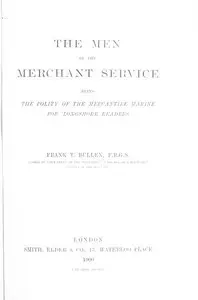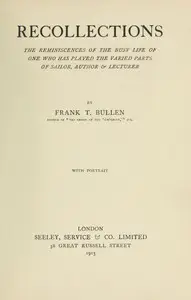"Advance Australasia: A Day-to-Day Record of a Recent Visit to Australasia" by Frank T. Bullen is a travel narrative written in the early 20th century. The book chronicles the author's experiences and impressions during a recent tour of Australasia, focusing on the contrasts between his initial visit and his observations on this current journey. Through descriptions of landscapes, societies, and political landscapes, Bullen reflects on the cultural and social evolution of the region. At the start of the text, the author reveals his initial journey to Australia thirty-four years ago and contrasts it with the streamlined experience on a modern steamship. He describes the changes in maritime travel and the improvements in passenger comfort, highlighting both joyful memories and the challenges faced on that first voyage. Bullen's detailed observations capture the beauty and intricacies of the Australian landscape, as well as the dynamics of human behavior, both on board and in port. As he moves through the regions, he begins to explore the social and political nuances of public life in places like Perth and Adelaide, hinting at the impact of historical events and the aspirations of its residents. (This is an automatically generated summary.)

Advance Australasia: A Day-to-Day Record of a Recent Visit to Australasia. Second Edition.
By Frank Thomas Bullen
"Advance Australasia: A Day-to-Day Record of a Recent Visit to Australasia" by Frank T. Bullen is a travel narrative written in the early 20th century...
Frank Thomas Bullen, British novelist, was born of poor parents in Paddington, London, on 5 April 1857, and was educated for a few years at a dame school and Westbourne school, Paddington. At the age of 9, his aunt, who was his guardian, died. He then left school and took up work as an errand boy. In 1869 he went to sea and travelled to all parts of the world in various capacities including that of second mate of the Harbinger and chief mate of the Day Dawn, under Capt. John R. H. Ward jun in 1879 when she was dismasted and disabled. Having spent 15 years of his life at sea, since the tender age of 12, he would later describe the hardships of his early life thus: I have been beaten by a negro lad as big again as myself, and only a Frenchman interfered on my behalf. Those were the days when boys in Geordie colliers or East Coast fishing smacks were often beaten to insanity and jumped overboard, or were done to death in truly savage fashion, and all that was necessary to account for their non returning was a line in the log to the effect that they had been washed or had fallen overboard. A parallel may be drawn with Joseph Conrad's career at sea aboard Torrens 1891–1893. He was a clerk in the Meteorological Office from 1883 to 1889. His reputation was made over the publication of The Cruise of the "Cachalot" (1898); and he also wrote, amongst other books, Idylls of the Sea (1899); Sea Wrack (1903); The Call of the Deep (1907) and A Compleat Sea Cook (1912), besides many articles and essays. He lectured extensively and was highly critical of Australasia's lack of defences against what he saw as imminent naval threats from Germany and Japan. He died at Madeira on 1 March 1915.


















